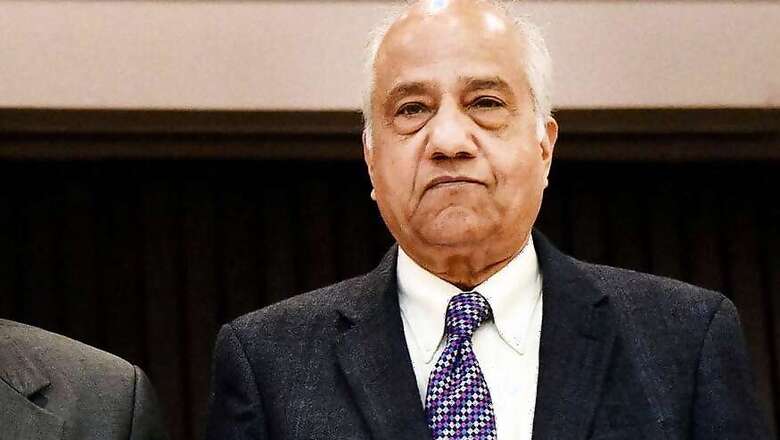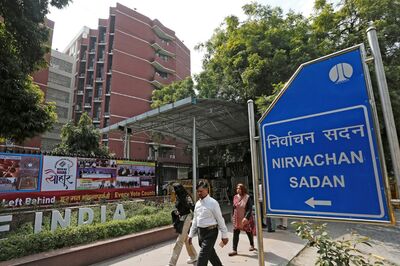
views
It is time for India to think of virtual courts to take some pressure off the swamped justice system and ensure better outreach to people in far-flung areas, said retired Supreme Court judge BN Srikrishna on Monday against the backdrop of the Covid-19 pandemic and nationwide lockdown.
He was speaking at a webinar session, Hunger Talks: 50 Days that Turned India', arranged by the NGO YUVA, with senior advocate Harish Salve and former Reserve Bank of India (RBI) governor Urjit Patel the other speakers.
Justice Srikrishna also said the pandemic has given a unique opportunity to everyone to introspect and bring humanity to the fore at a time when compassion appears to be a missing characteristic.
Picking up from him, Patel observed that prognostication in this context is very difficult, considering the multi-pronged worrying points of uncertainty involved. The behaviour of the virus tops the list, followed by the timeline of the treatment and the estimated time due for a vaccine.
The effectiveness of the government’s guidelines and policies comes next in line and the factor essential to it is the behaviour of the citizens. People have reacted differently to the crisis across the world, he said.
Taking a more severe but practical view, Salve said the pandemic has exposed the human race’s vulnerability to natural adversities and how humankind is utterly clueless when it comes to a definitive understanding of the virus even months after it started its killing spree.
People have not come out of their homes in months and the situation has reduced us to merely guessing the outcome of it all, he said. Another interesting change that the pandemic has brought upon us all, Salve added, is the return to a ‘oneness of mankind’ idea. Until a while ago, society had seen a shift towards a hard, insular and conservative thought process against the liberal, free speech and inclusive idea of thinking. And this did not just transpire in India. Europe, America too witnessed a sea change in its political and social spheres, he said.
Being afflicted by the coronavirus and its implications in an indiscriminate manner has shown people the transient nature of divisions like these, Salve said, adding that it has also shown us how we still have a long way to go with regards to technology and scientific knowledge.
The economists don’t know the economic solution out of it, politicians have no idea how to inculcate a political solution for it and the doctors and scientists are still trying to conceive a solution to deal with it, he said. Coming to India, the senior advocate said he believed it is time for the country to hit the reset button in the wake of this crisis and treat this as an opportunity to live and prosper together.
With the entire country confined inside their homes, India has taken to digitisation in more ways than one. Much of our data has been put up on various digital platforms for multiple service providers. With the personal data protection legislation still in its formulative stage, questions arise on safety and the potential for the data’s misuse and perpetuity.
Reacting to this, Justice Srikrishna, who is helping draft the new date privacy law for India, emphasised on the need to collect the information during this crisis as that helps understand the pattern of the virus and the level of spread. However, he said the lack of a strong law to protect personal data during any other time is a concerning factor. The lack of it, Srikrishna reiterated, will turn India into an Orwellian state.
The economy has seen a downward spiral with businesses being hit like never before and it will take them considerable time to get back on track. Companies have shut down or announced pay cuts and layoffs, and many workers are not even being paid their dues. Although India has announced a few measures to help wade through the crisis, that seems not enough at this point.
Elaborating on it, Patel said that the since analysis has shown that the government’s fiscal condition is not much better than it was during 2013-14, the Centre needs to prioritise its focus groups. The revenue will be sizeably lower this year and as such the focus should be need-based. The primary attention should be on healthcare and the Centre must ensure it is a sounding board for the states. The vulnerable and those more prone to being afflicted by the pandemic need to be looked after and also the Centre must be a support system for the financial sector if and when the need arises, he said.
Speaking on the need of a holistic solution for the crisis, Salve said the need is for an out-of-the-box approach. Asking to put the worry of fiscal deficit on the back burner, the senior advocate pressed on the importance of saving the country and the society at large before anything. The government has to provide monetary relief to the poor and ensure they are not killed by hunger first, he maintained.
Another positive outcome, Salve felt, is that the pandemic has brought out a never before seen political will and harmony within the country that would have otherwise been divisive.
Talking about the financial aspect, he observed that the law has not been crafted to tide through such an unprecedented situation and as such a new judicial regime has to be set up to help out with the companies that are undergoing losses.
Coming back to the digitisation of the judicial process, however, Justice Srikrishna expressed concerns over the ability to do this in an unhindered manner. He spoke of a need to get everyone associated with the judiciary to learn the ropes to effectively discharge their duties.
Talking about the economy, Patel spoke of the measures that the government has put in place for the vulnerable sections and, although admitting that it doesn’t support each and every section, he mentioned how a calibrated and structural process is being worked out to help with the instability the economy is going through. He also emphasised the need to devise a way out to come out of the virus-induced lockdown.
With the coronavirus affecting the education system too and in turn schools going digital, a concerning factor is the lack of facilities for most Indian students at home. A way to streamline educating the young minds, Salve said, is that the licence fees from telecom operators can be used to provide cheap tablets for the students. In India, the cost of infrastructure for education as against the cost of digital education is an important issue that needs to be studied. If done in a proper and ideal structure, it can take digital education to even the remotest villages of the country, he argued.
Circling back to the focal point of the discussion, Patel said, in the wake of the huge healthcare crisis dangling in front of the country, India needs to make testing for the virus ubiquitous and the cost of it should be borne by the government. If that is done, the private enterprises will also step up to take charge and be a support system for the government, he said. It needs to be at the centre of India facing up to the challenge of this unprecedented pandemic. He, however, warned that the country should be careful about risking going back to the ‘Licence Raj’ days, considering how the government has been given a free hand to micromanage almost everything.
Rounding off the discussion, both Srikrishna and Salve said it is not possible to give a responsible answer for a designated day or time when the pandemic vanishes off, but the time we as a society have got right now needs to be used to recognise our vulnerability and ponder upon what can be done ahead once the lockdown is lifted to unveil a new India that is ready to overcome what it has lost in these past few months.




















Comments
0 comment